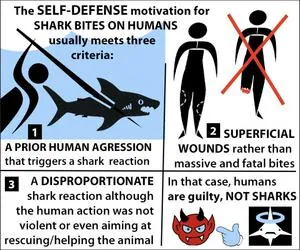
Shocking Truth: Shark Bites May Be Survival Instincts, Not Attacks!
2025-04-25
Author: Ming
Sharks have long been portrayed as terrifying predators, but recent research reveals a different narrative. Despite the media's portrayal of these creatures as ruthless killers, shark bites are incredibly rare—approximately 100 incidents yearly, with only about 10% resulting in fatalities.
A New Perspective on Shark Behavior
An international research team has unearthed a compelling argument: many shark bites might stem from self-defense rather than aggression. Dr. Eric Clua, the leading researcher from Université PSL, asserts, "Defensive bites from sharks are a reality stemming from perceived human aggression, and we must reevaluate blame in these interactions." This shift in perspective highlights the sharks’ primal instinct for survival.
The Alarming 'Panic Bites'
In French Polynesia, documented shark bites date back to the 1940s, but serious studies on the reasons behind these bites only began in recent decades. From 2009 to 2023, researchers logged a staggering 74 bites, with 4 thought to be defensive—indicating that 3-5% of shark bites could arise from fear.
Most self-defense bites occur in reaction to perceived threats like spear fishing or attempts to physically engage with the shark, often without warning. Although these incidents may involve multiple bites, they usually result in superficial wounds. Dr. Clua points out that these patterns mirror those of land predators like bears who exhibit similar behavior when threatened.
Understanding Shark Fear
Certain coastal sharks, such as the gray reef shark, are known for their territorial nature. Just a slight invasion of their space can provoke a reaction. In defensive scenarios, sharks might overreact and inflict more harm than warranted. As Clua notes, "Sharks are generally fearful of humans, and their forceful reactions might stem from an instinctual drive to survive rather than vengeance. This disproportionate response is also seen in humans."
Data Reveals Insights
Gathering global data on shark bites remains a challenge, but researchers are making strides. They analyzed records from the Global Shark Attack Files, which document nearly 7,000 bites since 1863, categorizing them as ‘provoked’ or ‘unprovoked.’ Surprisingly, they found that 322 incidents might have been defensive, aligning with the 5% figure from French Polynesia, suggesting that these findings could apply worldwide.
How to Stay Safe and Show Respect
To minimize the risk of encounters, avoiding any behavior perceived as aggressive is crucial. This includes refraining from trying to assist stranded sharks, which could be misinterpreted as a threat. Dr. Clua warns, "Do not engage physically with sharks, regardless of appearance. They may see any interaction as a form of aggression and react defensively. Showing them respect by keeping your distance is both safe and courteous."
In a world where sharks are either feared or glamorized, understanding their motivations offers a chance for more respectful coexistence. Perhaps the next time you hear of a shark encounter, consider the possibility that these majestic creatures are simply responding to their instincts!



 Brasil (PT)
Brasil (PT)
 Canada (EN)
Canada (EN)
 Chile (ES)
Chile (ES)
 Česko (CS)
Česko (CS)
 대한민국 (KO)
대한민국 (KO)
 España (ES)
España (ES)
 France (FR)
France (FR)
 Hong Kong (EN)
Hong Kong (EN)
 Italia (IT)
Italia (IT)
 日本 (JA)
日本 (JA)
 Magyarország (HU)
Magyarország (HU)
 Norge (NO)
Norge (NO)
 Polska (PL)
Polska (PL)
 Schweiz (DE)
Schweiz (DE)
 Singapore (EN)
Singapore (EN)
 Sverige (SV)
Sverige (SV)
 Suomi (FI)
Suomi (FI)
 Türkiye (TR)
Türkiye (TR)
 الإمارات العربية المتحدة (AR)
الإمارات العربية المتحدة (AR)